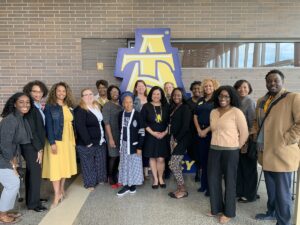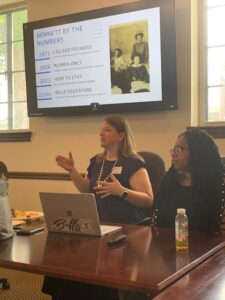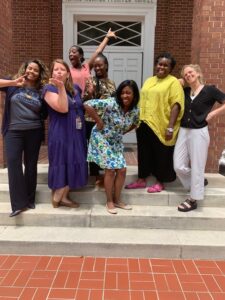August 1, 2023 — The National Center for Teacher Residencies (NCTR) was awarded a $6.7 million Supporting Effective Educator Development (SEED) grant in fall 2022 from the U.S. Department of Education to develop and scale teacher residencies to recruit, prepare, and retain highly effective educators, particularly educators of color. As a part of this impactful work, NCTR set out to collaborate with historically Black colleges and universities (HBCUs), learning from and building upon their rich legacy of preparing Black educators in the United States.

To ground this work in regional context, NCTR partnered with the Center for Racial Equity in Education (CREED) to convene six of the esteemed NC10 HBCU Institutions—Bennett College, Livingstone College, North Carolina A&T University, North Carolina Central University, Shaw University, and St. Augustine’s University—for our Residency Foundations Programming. Residency Foundations is a foundational consulting engagement designed to support institutes of higher education (IHEs), school districts, and charter management organizations (CMOs) as they consider the viability and sustainability of designing and ultimately operating a teacher residency program with NCTR’s support. Once Residency Foundations is completed, IHEs, school districts, and CMOs can elect to continue the process of designing a teacher residency program via NCTR’s Residency Design Academy (RDA). Offered over a monthslong consulting engagement, Residency Foundations covers the components of NCTR’s Levers for Equitable Teacher Residencies, with an emphasis on understanding the teacher residency model, the value of partnerships, and the financial sustainability of teacher residency programs.
Our consulting experience with NC10 included reading research, exploring theory, understanding the teacher preparation landscape in North Carolina, touring several of the NC10 campuses, and hearing directly from students currently enrolled in NC10’s teacher preparation programs.

This work not only enriched NCTR’s understanding of HBCU-based teacher preparation but also created a deep sense of connection with the experienced, accomplished faculty we worked with over our six month consulting engagement. While discussing the possibilities of the teacher residency model, this group had an opportunity to learn together and discuss the unique characteristics and values that have contributed to each institutions’ impact on the preparation of educators of color. We came away understanding that while their circumstances may be broadly categorized as similar, no two NC10 programs are the same. This will be essential as we continue our work with them to design learning experiences that meet the needs of local communities and school districts with whom they will partner to design and operate teacher residency programs. Additionally, we had some honest and healing conversations about the barriers that these programs face— for example, the historical and chronic underfunding of HBCU education programs— as they do the good and hard work preparing educators of color.

Some of our greatest joys from the experience grew from the relationships we developed. We were fortunate to have the opportunity to learn from and with each other and get to know not only the programs but also the dedicated people that are the heart and soul of this work. The room (in-person and virtual) was always filled with a spirit of collaboration and camaraderie, and the unique shared regional experience of the cohort allowed for a lot of learning for NCTR. We had an opportunity to engage in a human and participant-centered process that made room for us to learn and to positively challenge our own assumptions about what goes into seeding a teacher residency program at these institutions and in the state of North Carolina. Our work and learnings with the NC10 has already and will continue to shape and impact NCTR’s work not only with HBCUs but with all of the institutions of higher education we work with in our Network. This experience affirmed our commitment to center the humanity and lived experiences of Black teacher residents and those who mentor them into the field. We are excited that all six institutions have opted into Residency Design Academy for the upcoming year. We look forward to the beautiful fruit of equitably prepared and day-one-ready educators of color that will come from our coalition building together. Stay tuned as we continue to share the exciting work we are doing in North Carolina with CREED and these esteemed institutions!
Warmly,
Allyson Williams Eubanks, Director of Programs
Elizabeth Hearn, Director of Programs